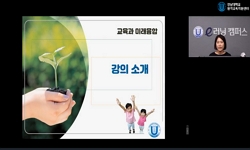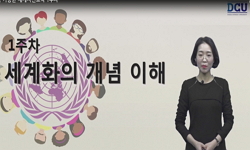In this research, the change of Korean middle-school science education environments is investigated through analyzing eighth graders’ survey data collected over the past 20 years of TIMSS. We extracted educational context variables that provide mean...
http://chineseinput.net/에서 pinyin(병음)방식으로 중국어를 변환할 수 있습니다.
변환된 중국어를 복사하여 사용하시면 됩니다.
- 中文 을 입력하시려면 zhongwen을 입력하시고 space를누르시면됩니다.
- 北京 을 입력하시려면 beijing을 입력하시고 space를 누르시면 됩니다.
부가정보
다국어 초록 (Multilingual Abstract)
In this research, the change of Korean middle-school science education environments is investigated through analyzing eighth graders’ survey data collected over the past 20 years of TIMSS. We extracted educational context variables that provide meaningful information on changes of Korean science education, and have been surveyed more than 3 study cycles up to TIMSS 2015. The selected educational context variables include school resources and school climate from the school principal’s questionnaires, and teacher characteristics and instructional activities from the teacher’s questionnaires. For each context variable, we analyzed its trend over TIMSS cycles, and discussed its implications in light of Korean educational policy and curriculum changes. Based on the results, we recommended several ways that help to improve science teaching and learning in light of lab assistants, computer availability, teacher learning community, and middle school Earth science curriculum.
참고문헌 (Reference)
1 김수진, "중학생들의 수학에 대한 흥미와 가치 인식 변화가 수학 성취도에 미치는 영향 분석" 교과교육연구소 18 (18): 683-701, 2014
2 이재봉, "중학교 과학 수업 학습 환경에 대한 변화 분석" 한국과학교육학회 36 (36): 717-727, 2016
3 임선아, "수학성취도의 예측변인으로서의 정의적 요인 검증: OECD 수학성취도 상위 10개국 비교 연구" 한국교육평가학회 29 (29): 357-382, 2016
4 곽영순, "사례 연구를 통한 중학교 과학수업에 대한 범교과 수업컨설팅의 특성 탐색" 한국과학교육학회 36 (36): 269-277, 2016
5 Cho, J., "Ways of improving Korean students' affective characteristics based on PISA and TIMSS results. KICE Research Report CRE 2012-4" 273-, 2012
6 Sang, K., "The Trends in International Mathematics and Science Study (TIMSS): Findings from TIMSS 2015 for Korea" KICE 342-, 2016
7 OECD, "Teaching practices and pedagogical innovation: Evidence from TALIS" OECD Publishing 2012
8 Seo, K., "Teacher learning community: An approach for collective professional development" Hakjisa 294-, 2015
9 곽영순, "TIMSS 2015 중학교 2학년 지구과학 영역에 대한 우리나라 학생들의 성취 특성 및 교육과정 연계성 탐색" 한국과학교육학회 37 (37): 9-16, 2017
10 Foy, P., "TIMSS 2015 user guide for the international database" 90-, 2017
1 김수진, "중학생들의 수학에 대한 흥미와 가치 인식 변화가 수학 성취도에 미치는 영향 분석" 교과교육연구소 18 (18): 683-701, 2014
2 이재봉, "중학교 과학 수업 학습 환경에 대한 변화 분석" 한국과학교육학회 36 (36): 717-727, 2016
3 임선아, "수학성취도의 예측변인으로서의 정의적 요인 검증: OECD 수학성취도 상위 10개국 비교 연구" 한국교육평가학회 29 (29): 357-382, 2016
4 곽영순, "사례 연구를 통한 중학교 과학수업에 대한 범교과 수업컨설팅의 특성 탐색" 한국과학교육학회 36 (36): 269-277, 2016
5 Cho, J., "Ways of improving Korean students' affective characteristics based on PISA and TIMSS results. KICE Research Report CRE 2012-4" 273-, 2012
6 Sang, K., "The Trends in International Mathematics and Science Study (TIMSS): Findings from TIMSS 2015 for Korea" KICE 342-, 2016
7 OECD, "Teaching practices and pedagogical innovation: Evidence from TALIS" OECD Publishing 2012
8 Seo, K., "Teacher learning community: An approach for collective professional development" Hakjisa 294-, 2015
9 곽영순, "TIMSS 2015 중학교 2학년 지구과학 영역에 대한 우리나라 학생들의 성취 특성 및 교육과정 연계성 탐색" 한국과학교육학회 37 (37): 9-16, 2017
10 Foy, P., "TIMSS 2015 user guide for the international database" 90-, 2017
11 Martin, M.O., "TIMSS 2015 international results in science, Boston College, TIMSS & PIRLS International Study Center"
12 Mullis, I.V.S., "TIMSS 2015 assessment frameworks" TIMSS & PIRLS International Study Center, Boston College 2013
13 Choe, S.H., "Strategies for improving the affective characteristics of Korean students based on the results of PISA and TIMSS. KICE Research Report RRE 2013-8" 406-, 2013
14 MOE, "Promotion plan for educating human resources for SW centered society"
15 Ku, J., "OECD Programme for International Students Assessment: An in-depth analysis of PISA 2015 results. KICE Research Report RRE 2017-9" 158-, 2017
16 MOE, "General plans for science education" 2016
17 Kim, S., "Findings from TIMSS for Korea: TIMSS 2011 international results. KICE Research Report RRE 2012-4-3" 460-, 2012
18 MOE, "Basic plans for the fifth educational information (2014-2018)" MOE 2014
19 Mullis, I.V.S., "20 Years of TIMSS: International trends in mathematics and science achievement, curriculum, and instruction" TIMSS & PIRLS International Study Center, Lynch School of Education, Boston College and IEA 90-, 2016
동일학술지(권/호) 다른 논문
-
Exploring Students Competencies to be Creative Problem Solvers With Computational Thinking Practices
- 한국지구과학회
- 박영신
- 2018
- KCI등재,ESCI
-
- 한국지구과학회
- 박영신
- 2018
- KCI등재,ESCI
-
An Analysis of the Effects of Learning Stress for Inquiry Activities in College Earth Science Course
- 한국지구과학회
- 조재희
- 2018
- KCI등재,ESCI
-
Temporal and Spatial Variations of the ML 5.8 Gyeongju Earthquake on September 12, 2016
- 한국지구과학회
- 이경수
- 2018
- KCI등재,ESCI
분석정보
인용정보 인용지수 설명보기
학술지 이력
| 연월일 | 이력구분 | 이력상세 | 등재구분 |
|---|---|---|---|
| 2027 | 평가예정 | 재인증평가 신청대상 (재인증) | |
| 2021-01-01 | 평가 | 등재학술지 유지 (재인증) |  |
| 2018-01-01 | 평가 | 등재학술지 유지 (등재유지) |  |
| 2015-01-01 | 평가 | 등재학술지 유지 (등재유지) |  |
| 2011-01-01 | 평가 | 등재학술지 유지 (등재유지) |  |
| 2009-01-01 | 평가 | 등재학술지 유지 (등재유지) |  |
| 2008-02-19 | 학회명변경 | 영문명 : 미등록 -> The Korean Earth Science Society |  |
| 2007-01-01 | 평가 | 등재 1차 FAIL (등재유지) |  |
| 2005-01-01 | 평가 | 등재학술지 유지 (등재유지) |  |
| 2002-01-01 | 평가 | 등재학술지 선정 (등재후보2차) |  |
| 1999-07-01 | 평가 | 등재후보학술지 선정 (신규평가) |  |
학술지 인용정보
| 기준연도 | WOS-KCI 통합IF(2년) | KCIF(2년) | KCIF(3년) |
|---|---|---|---|
| 2016 | 0.47 | 0.47 | 0.49 |
| KCIF(4년) | KCIF(5년) | 중심성지수(3년) | 즉시성지수 |
| 0.51 | 0.52 | 0.909 | 0.21 |




 ScienceON
ScienceON 코리아스칼라
코리아스칼라






